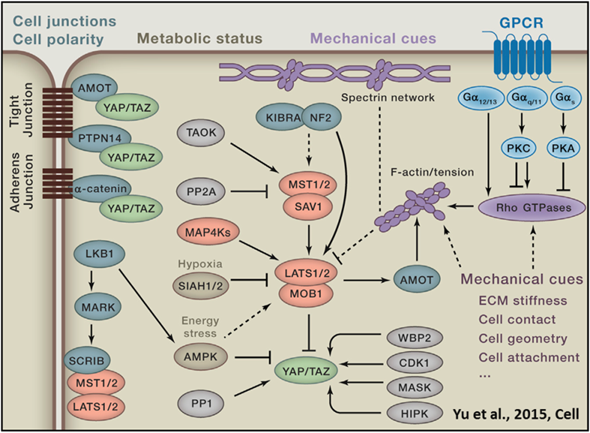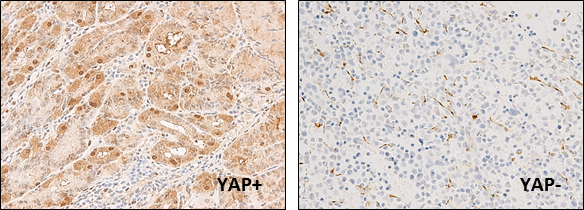
Life-or-death, our cells or ourselves are struggling throughout the life cycle, decisions are made whenever a genetic aberration or an environmental challenge is encountered. For instance, unsuccessful pregnancy or birth defects occurs at early stage of the development, tissue regeneration or degeneration happens following tissue damages, and tumorigenesis initiates when cell growth is out of control. The fitness of a tissues is heavily depended on the proliferation and differentiation of tissue specific stem cells, the latter is regulated by different signals at the stem cell niche. The communication between stem cells and niche factors is mediated by diverse signaling pathways, such as Wnt, Shh, TGF-β,Notch and Hippo. These pathways, via a cell-autonomous or a non-cell-autonomous approach, instruct cells to proliferate, differentiate, die, migrate, or hibernate. Our group is interested in the Hippo signaling pathway—a pathway plays a pivotal role in early development, tissue regeneration, and tumorigenesis. Currently, we are dissecting the regulatory mechanisms of the Hippo pathway, and studying its biological/pathological functions, particularly in tissue regeneration and cancer.
生死有命?我们究其一生,我们每一个细胞也时刻都在纠结着生死。面对一个小小的基因突变,或者一个环境因素的偶然改变,细胞或机体都要做出应变。例如,生命的早期可能发生失败的妊娠或出生缺陷,成体组织在损伤后会有序修复再生或退化,而细胞生长失控则会导致肿瘤的发生。组织器官的状态很大程度上受到成体干细胞增殖和分化的影响,而成体干细胞的功能被它们微环境中的多种信号调控。干细胞和微环境因子之间的互动由多种信号通路介导,如Wnt、Shh、TGF-β、Notch、以及Hippo等。这些通路能够以细胞自主或非自主的方式控制细胞的增殖、分化、死亡、迁移、或休眠。我们团队的研究聚焦在Hippo信号通路,该通路在器官发育、组织再生及肿瘤发生发展中发挥重要作用。目前,我们不仅对Hippo通路的分子调控机制进行着深入的研究,同时也在探索该通路的生物学及病理学功能,尤其是在组织再生和肿瘤发生过程中的作用。

The Hippo Pathway
The Hippo pathway, represented by a kinase cascade, has been exquisitely established by genetic studies in both Drosophila and mice: MST1/2 (the Hippo kinases) or MAP4Ks phosphorylate and activate LATS1/2, and LATS1/2 phosphorylate and inactivate YAP/TAZ transcriptional co-activators . YAP/TAZ regulate target gene expression mainly through interaction with TEAD transcription factors. The Hippo pathway is regulated by upstream components (such as NF2, KIBRA, and AMOT) or diverse physical/biochemical signals (such as cell polarity, cell-cell contact, cell-ECM interaction, mechanical cues, and diffusible signals including a variety of G-protein-coupled receptor ligands ). We are particularly interested to know how these upstream signals transmit to downstream kinases and effectors.
Hippo信号通路主体部分是一个激酶级联反应,由大量果蝇及小鼠遗传学研究勾勒出来。MST1/2(Hippo激酶)或MAP4Ks磷酸化并且激活LATS1/2,而LATS1/2则磷酸化YAP/TAZ并导致后者失活。YAP/TAZ是同源的转录共激活因子,它们通过结合TEAD转录因子调节靶向基因的转录。Hippo通路的激酶受到上游成员(如NF2、KIBRA及AMOT)的调控,多种物理或生物化学信号(如细胞极性、细胞间接触、细胞与细胞外基质的相互作用、机械性信号及包含大量的G蛋白耦联受体相关游离信号)都能够影响Hippo通路的活化状态。我们团队目前在研究不同上游信号是如何传递到下游的激酶和效应分子。

Hippo Pathway In Tissue Regeneration
The Hippo pathway is involved in the regeneration of several organs, such as intestine, liver, and skin. Following tissue damage, the activity of YAP, the major effector of the Hippo pathway, is transiently induced, which in turn promotes expansion of tissue-resident progenitors and facilitates tissue regeneration. However, how the Hippo pathway activity is dynamically regulated remains mysterious. Moreover, given the importance of the Hippo pathway in cell plasticity, novel and specific activators of YAP may be a powerful tool for promoting tissue regeneration. We are interested to develop new strategies to facilitate tissue regeneration by targeting the Hippo pathway.
Hippo通路参与肠、肝、皮肤等多种器官的修复再生。组织受损后,YAP立即被激活,进而调节成体干细胞群落并促进组织再生。然而,在损伤修复再生过程中,Hippo通路如何被动态调节仍然是一个谜题。基于Hippo通路在细胞可塑性中的重要性, YAP激动剂很可能成为促进组织再生的强大工具。我们希望针对Hippo通路的研究能发现促进组织再生的新策略。

Hippo Pathway In Cancer
YAP and TAZ, the major effectors of the Hippo pathway, are two homologous oncoproteins, and they are inhibited by upstream regulators with tumor suppressor function. YAP and TAZ are frequently activated or highly expressed in various cancer specimens. Moreover, their activity has been linked to resistance to some widely used anti-cancer drugs, and YAP activation is responsible for relapse in some cancers. Thus the Hippo pathway represent an ideal target for anti-cancer therapies. We are interested in the mechanisms underlying YAP and TAZ activation in cancer, and the function of YAP and TAZ in cancer initiation and development.
一般认为YAP和TAZ是致癌蛋白,其上游调控因子大部分是抑癌蛋白。YAP和TAZ在多种肿瘤标本中被激活或存在高表达的情况, YAP活化导致常用抗肿瘤药耐受,并且YAP活化同一些肿瘤的复发也紧密相关。因此,Hippo该通路是一个理想的抗癌药物靶点。我们的团队正在研究YAP和TAZ在肿瘤中的作用机制,以及它们在肿瘤发生发展过程中的功能。
